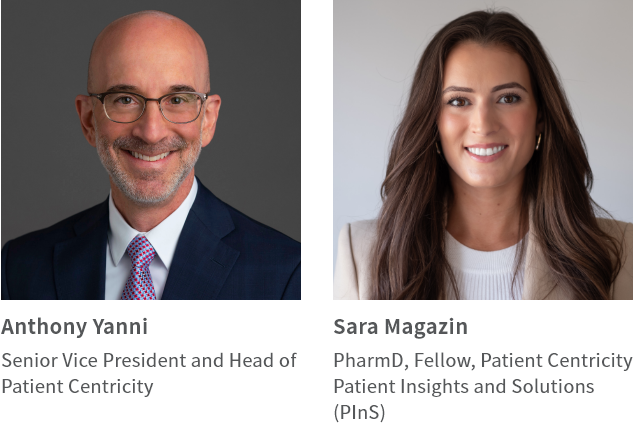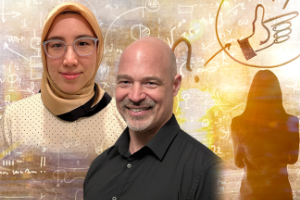Patient Centricity and AI: Navigating the Promise and Pitfalls

The rapid progression of artificial intelligence (AI) is challenging conventional practices and promising unprecedented advancements for the world. Yet, a looming question remains: at what cost? While AI has unarguably the potential to impact patient-centric healthcare, how do professionals in the field perceive and navigate this evolving landscape?
Dr. Anthony Yanni, a seasoned clinical practitioner and Head of Patient Centricity at Astellas, sat down with Sara Magazin, a recent PharmD graduate* and Patient Insights and Solutions (PInS) Fellow, to discuss this topic, delving into their generational perspectives on AI and sharing their excitement and concern.
Index
- What excites you the most about the possibilities that AI could bring to enhance patient-centered healthcare?
- How do you foresee AI being applied to improve patient outcomes and experiences?
- What potential concerns or challenges do you foresee in integrating AI into patient-centric practices?
- How do we strike a balance between fostering innovation and ensuring cautious, ethical implementation?
What excites you the most about the possibilities that AI could bring to enhance patient-centered healthcare?
“AI can help ensure an inclusive approach, allowing diverse perspectives across age groups and subpopulations.”
Anthony: I'm excited about the positive impact AI could have on diversity and connectivity. AI holds tremendous potential when considering data sources and volume, and healthcare companies willing to ask the right questions, establish the proper procedures, and curate the information effectively stand to be at an advantage because this approach can mitigate some of the challenges we face related to ensuring diversity in the patient populations we are asking questions to, minimizing the risk of a monolithic view.
Connectivity is also vital to what we do at Astellas to ensure all voices are equal, whether it's a patient in rural Scotland, the center of Los Angeles, or any location, remote or otherwise, around the world. AI can support this inclusive approach, allowing diverse perspectives across age groups and subpopulations, which is particularly essential for diseases with varied impacts, such as diabetes.
Sara: I agree. I'm also excited about AI's potential to impact each stage of the patient journey. In particular, the potential for early intervention. After all, as humans, we're only capable of so much. When a disease is caught so late, patients often wonder, "How come this wasn't caught earlier?" This is potentially where technology can come into play.
How do you foresee AI being applied to improve patient outcomes and experiences?
“VR experiences create understanding, motivation, and free-thinking, leading to better solutions to support the teams developing the molecules and medicines.”
Sara: In many respects, patient centricity is ideally suited to take advantage of AI to collect primary patient data that guides the development of solutions. For instance, exploring virtual settings or simulating patients' experiences allows us, as employees, to gain valuable insights. Technologies like virtual reality (VR) and remote monitoring are pivotal to understanding patient experiences. I know the PInS team at Astellas has already been utilizing this, and it'll be interesting to see what more we can do as AI progresses.
Anthony: Absolutely. It’s true that AI can be applied to analyze numerous molecules and their potential impact on diseases using algorithms, etc., but I believe its genuine value emerges when combined with patient centricity. For example—as you mentioned, Sara—utilizing VR. In the case of the PInS team, they worked alongside the internal teams that were developing a potential solution for patients with visual problems by having them put VR goggles on and see and experience what a patient with that underlying disease sees when they look at a Van Gogh painting or when they're looking at the plate trying to have dinner.
These experiences create understanding, motivation, and free-thinking, and it helps us provide better solutions to support the teams developing the molecules and the medicines. Understanding patients in real-world settings, including their behaviors, challenges, and barriers, is vital to comprehending the last mile, meaning how we effectively deliver developed treatments to patients.
Sara: I'm looking forward to contributing to that development. And, of course, AI applications can go beyond internal terms and be a tool that patients can use to help articulate their challenges.
Anthony: Exactly right. In pediatric rare diseases, for example, AI could become transformative. It offers a powerful tool for broader communities to empathize with the challenges faced by these children. By virtually experiencing their world—especially when the children might struggle to express their experiences verbally—we can enhance awareness and understanding.
What potential concerns or challenges do you foresee in integrating AI into patient-centric practices?
“Understanding and mitigating biases in AI algorithms is crucial.”
Sara: One of the most obvious concerns is data breaches. If someone's credit card information is breached, they can cancel it, but health information breaches are irreversible. Many patients are understandably concerned about the security of their healthcare journeys, in the same way that everyone—including my generation, who has grown up with technology—is skeptical about the extent to which we invite AI into our lives.
I'd also say that transparency in algorithmic decision-making is crucial. We need clear explanations and an understanding of how AI is implemented. Similar to patient care notes, we need to comprehend why AI suggests certain treatments or health plans. It's great to have technology aiding decision-making, but we also need to grasp the origins of AI decisions and address potential biases. Understanding and mitigating biases in AI algorithms is key.
Anthony: That's a terrific answer; I agree with everything you said. And it’s very interesting to hear that your generation, who grew up in a world where technology was more integrated into your lives, shares similar concerns. From my perspective, it's essential to recognize that more data doesn't automatically mean better information. We must maintain discipline in framing precise questions, understanding the data-gathering process, and executing algorithms. Curation and unbiased examination of results are vital, ensuring they align with the original intent.
Sara: Right. We have to proceed that way to build patient trust, transparently communicating the benefits, risks, and limitations of incorporating AI into their care journey. In the same way that we obtain consent for surgery, articulating the potential drawbacks is so important. While patients may desire perfection, emphasizing the realistic aspects and refraining from overpromising becomes imperative.
Anthony: Right, you've hit on one of the biggest risks with AI—the false expectation of perfection. We must manage patient trust by openly discussing the benefits and limitations of AI in healthcare because it's not going to be perfect.
How do we strike a balance between fostering innovation and ensuring cautious, ethical implementation?
“Science is our passion, but patients are our priority. AI should be there to enhance, not replace, current practices.”
Sara: The phrase "don't bite off more than we can chew" comes to mind when I consider this. Building trust and transparency with patients is crucial and educating them about AI in their care and explaining the risks and benefits is key. Nothing should be forced, patients should be able to choose whether or not to implement AI in their care, making it a collaborative decision.
When implementing AI, I feel feedback mechanisms, monitoring, and auditing are essential to understand its impact on patients. I also think things like seamless integration into existing electronic health record systems should be considered to avoid disruption for healthcare providers. Overall, AI should be there to enhance, not replace, current practices.
Anthony: Great answer, Sara; I agree entirely. When I think about everything we do at Astellas, I can sum it up by saying: "Science is our passion, but patients are our priority." And I view AI through the same lens. AI can be a passion; we realize this is an opportunity to bring solutions to patients sooner and more efficiently and in a more impactful way. But we also have the patience and the discipline to apply it carefully so as not to distract us from our overriding objective, the health of patients.
Astellas launched its first Patient Partnerships Annual Report in 2023, featuring project summaries and patient organization representatives' testimonials. Access the report here.
* A PharmD graduate has successfully completed a Doctor of Pharmacy program, gaining the necessary knowledge and skills to practice as a pharmacist.
Astellas Patient Centricity Series
Patient Centricity Solve-a-Thon: Igniting the Collective Imagination to Tackle Unmet Medical Needs
Read morePatient centricity at Astellas—all about action
Read more
Related Links











